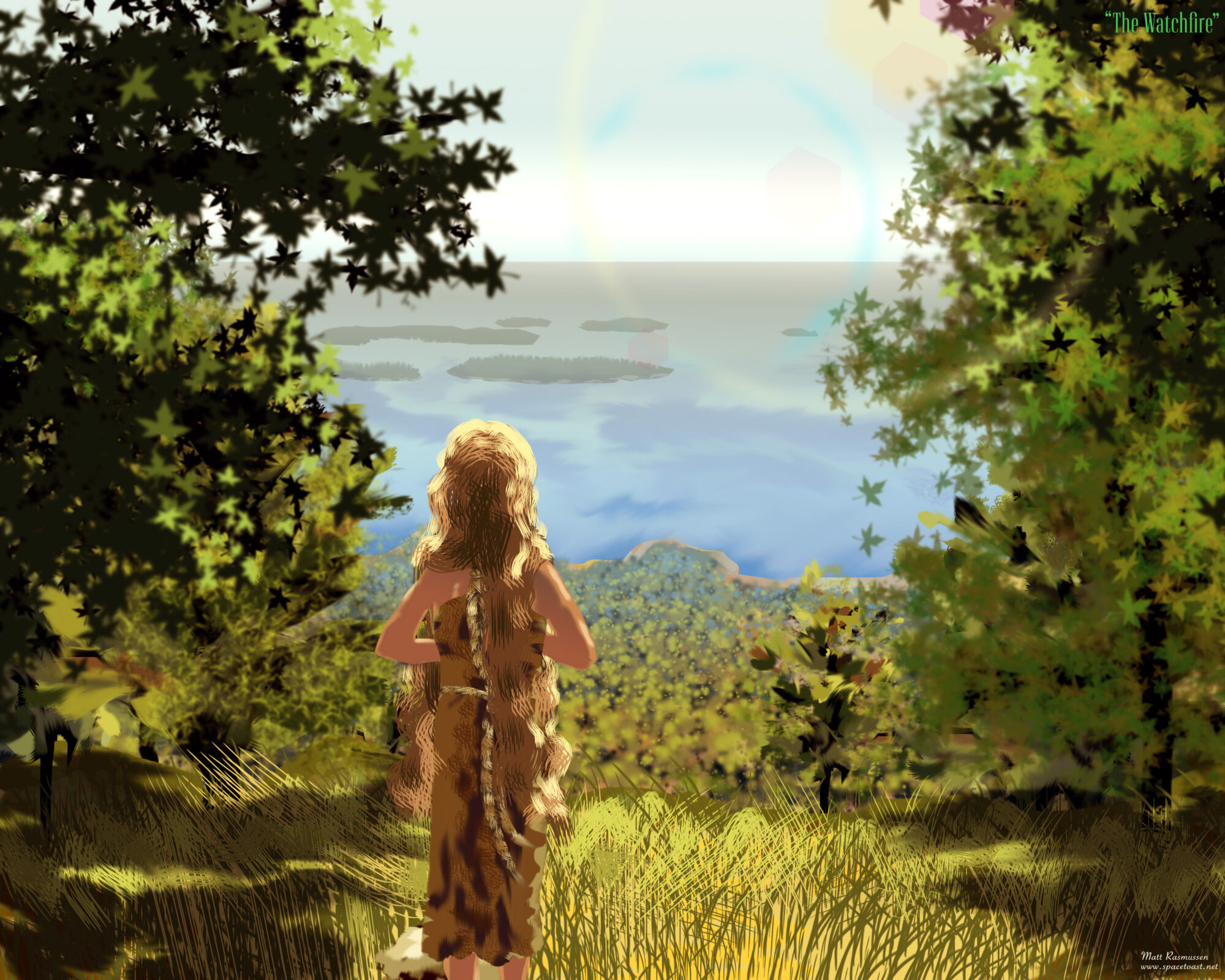You arrive in the town. You check into an inn. It’s on a back street. Out of the way. You’re wanted criminals, so best not to draw attention to yourselves.
You’ve been trying to find Tintmere since the airship crash. She should be in this town. But where?
Porcelain and little Night set off with a shopping list. You and Kell head upstairs.
There’s a window. The room overlooks an equally rickety row of buildings. Fourth floor. Lots of crisscrossing clotheslines and rising steam, people milling about below. In the distance over the rooflines: the Lightning Tower. Your ultimate goal.
Concrete pebbles fall discretely into the drowned, weedy flower pot in front of you. You crane, look up.
A bounty hunter tromps silently across the rusty pipes on the roof. The shadows of two more flit between the eaves.
You lean back in, smile, head gesture to Kell. A row of shurikens materialize in his hand, and he melts into the shadows. Hazard another glance out.
There’s a bamboo-like pole caught between your building and the one across the street. One floor down. It looks tenuous. But you have been working on your balance.
The next room? The walls can’t be too thick.
Nah. More fun to hide in the ratan basket.
Moments later, light feet land on the windowsill. Simultaneously, the door flies off its hinges. Two bounty hunters race into the empty room. They look around, walk to the center of the room. Suddenly a basket and a shadow burst to life, and both bounty hunters are flung out the open window with hardly a cry.
The ceiling caves in. It’s time for the big daddy bounty hunter. You exchange blows, and are both parried and thrown back. Not good. He hasn’t even broken a sweat. You grab Kell, flip him up onto the roof and climb out. The wall explodes. You make a grab for a drain pipe, swing out across sickening open space, and — Kell’s throw line jerks the pipe up toward the roof. You land. Smile. And RUN!
Rooftop chase, as the overpowered bounty hunter hurls force blasts after you, shredding the ancient stone. Chickens squawk. Cisterns topple. An adorable little girl tends a lovely three foot square rooftop garden; you scoop her up as you run by, and apologize, as the bounty hunter smashes her four flowers.
You give the girl to Kell, saying you’d like to try something. You insult the giant. A lot. Kell breaks left, sliding down the side of a building. You break right. It worked! He’s following you.
Crap.
Fight! Fighting doesn’t work. Escape! He catches you in midair. The bounty hunter sneers that the fee still gets paid if all your limbs have been pulled off. This is it.
Shwunk! The bounty hunter shakes you, looks around indeterminately. He reaches back. A magic dagger wrapped in lace protrudes from between his shoulder blades. He topples, turning to wood. The wood bleaches, hollows, cracks, shatters — poof! Nothing but dust.
You pick yourself up, squint into the sun. A lace-adorned figure steps toward you through the haze, waving. Tintmere!
—–
Now imagine that the preceeding had been generated: The overall plot. The long separation from a comrade. The clues that led you to her. The streets. The repetition of the larger goal. The foreshadowed tip-off at the flower box. The personally appropriate strategy options. The easy mini-bosses. The unstoppable mega boss. The setback getting onto the roof. The dramatic save. The comic timing. The race. The moral choice. The losing battle. The last minute save, leading into the storyline completing reunion.
As flashy as today’s RPGs are, they’re still not true Role Playing Games. In them, players are rewarded for figuring out how the game engine works and finding ways to best it, not — as the name would suggest — for immersing themselves in the role of the character.
How does a game engine implement literary devices? How do you reinforce the players’ choice to have more fun with the story, rather than the choice to simply learn better chess positions? Printed paper+pencil+friends role playing games have invented some interesting story game concepts, but digital RPGs still rely largely on grinding in the final analysis.
I’m not suggesting that hard work shouldn’t bring character improvement, but I sanction it only because that too is a literary device. It’s not, however, the only literary device. In the early days of computer games, perhaps it was the only trope that could be realistically implemented. Are we at the end of the beginning of computer games yet?
Those looking for something a little more crunchy may enjoy my RPG Stats Comparison Chart.
